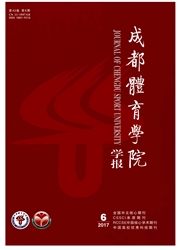

 中文摘要:
中文摘要:
为进一步揭示作为武术根底的民间武术的文化特质与变迁逻辑,深入理解民间武术与民俗生活之间的融合互动关系,以及探寻武术文化资源的创造性转化路径,本研究以民国时期青羊宫花会“打金章”为个案,从历史人类学的视角,主要运用文献资料法,对民俗生活中民间武术的权力实践与精神实质进行了深入的考察分析。研究指出:民间武术与民俗生活的融合历史悠久且普遍存在,民间武术丰富了民俗生活,同时也成为民俗生活的结构性要素。在青羊宫花会“打金章”中,不同主体围绕“利益”进行了权力实践。藉由民俗生活,“打金章”完成了对自身日常生活化的叙事,并在“释放欲望,超越‘日常’”“突破秩序,创造新生”“挑战规约,颠覆旧俗”的过程中塑造了尚武狂欢精神。这体现了民俗生活中民间武术的社会历史生成与狂欢精神实质。基于日常生活中民间武术的基础性地位,研究指出,当代中国武术的现代化变革与文化资源创造性转化应对融入生活世界的民间武术予以应有的重视与反思。
 英文摘要:
英文摘要:
In order to reveal the cultural nature and evolution logic of folk Wushu - the basis of Chinese Wushu, understand the interaction and integration of folk Wushu and folk life, and explore the creative transformation path of Wushu cultural resources, the present paper takes the ' Gold Medal Tournament' in the Qingyang Temple in Chengdu as an example to investigate and analyze through the method of literature review the power politics and carnival spirit of folk Wushu from the perspective of historical anthropology. The study shows that the amalga- mation of folk Wushu and folklore has a long history and is commonplace. The amalgamation not only enriches folklife, but also becomes a component of folklife. In the Gold Medal Tournament, people of different interest groups practiced their power politics. By way of folklife, the ' Gold Medal Tournament' narrates itself as part of daily hfe, and shapes the carnival spirit of Wushu by "letting out people' s desires, transcending ' daily neces- sities'" , "breaking orders and creating new life", and "challenging traditional norms and subverting old cus- toms". This reveals the social - historical transformation and carnival spirit of Wushu. In view of the fundamen- tal role that folk Wushu plays in daily life, the paper points out that folk Wushu should be paid due attention and reflected on in the modernization of Wushu and the creative transformation of Chinese culture.
 同期刊论文项目
同期刊论文项目
 同项目期刊论文
同项目期刊论文
 期刊信息
期刊信息
